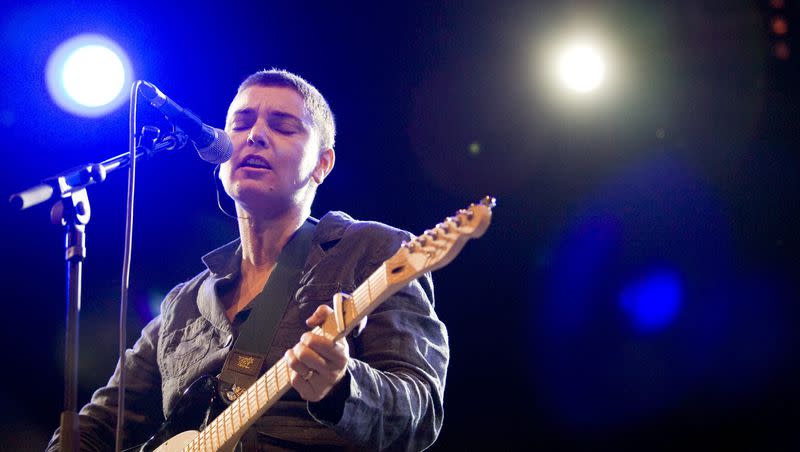Singer, activist Sinead O’Connor has died at the age of 56

Sinead O’Connor, the Irish singer-songwriter who transformed Prince’s “Nothing Compares 2 U” into a power ballad that became a No. 1 hit worldwide, has died at the age of 56.
“It is with great sadness that we announce the passing of our beloved Sinéad,” O’Connor’s family said in a statement Wednesday, reported by BBC. “Her family and friends are devastated and have requested privacy at this very difficult time.”
Sinead O’Connor’s rise to stardom — and controversy
“Nothing Compares 2 U,” off O’Connor’s critically acclaimed 1990 album “I Do Not Want What I Haven’t Got,” earned a few Grammy nominations and contributed to Rolling Stone naming her artist of the year in 1991, The Associated Press reported.
“She proved that a recording artist could refuse to compromise and still connect with millions of listeners hungry for music of substance,” Rolling Stone wrote, per The Associated Press,
At 24, O’Connor won the Grammy for best alternative musical performance in 1991 — an award she refused to accept as she criticized the music industry.
“They acknowledge mostly the commercial side of art,” read a part of O’Connor’s letter to the Academy, per Entertainment Weekly. “They respect mostly material gain, since that is the main reason for their existence. And they have created a great respect among artists for material gain — by honoring us and exalting us when we achieve it, ignoring for the most part those of us who have not.”
That’s just one illustration of O’Connor’s activism that was in the spotlight as much as her music. A critic of the Catholic Church, the singer sparked outrage in 1992 when she ripped up a photo of Pope John Paul II while appearing on NBC’s “Saturday Night Live,” according to The Associated Press. She was banned from NBC and got booed off the stage at a Bob Dylan tribute concert a few weeks later, per The New York Post.
Related
“Nothing Compares,” a documentary about O’Connor that premiered at the Sundance Film Festival in 2022, recalls this controversial moment in the singer’s career.
“She blows the candle out, she goes offstage. I had gone into the dressing room after her and I said, ‘I can’t get you out of this,’” a person connected to “SNL” at the time says in the trailer for the film. “And she said, ‘You know what? I don’t want you to.’”
“I wasn’t thinking to myself I must be strong. I didn’t know I was strong,” O’Connor reflected in the trailer for the documentary, which is now available for streaming on Paramount+. “An artist’s job is sometimes to create the difficult conversations that need to be had. That’s what art is for.”
O’Connor released 10 studio albums over her career, the last titled “I’m Not Bossy, I’m The Boss,” which released in 2014, according to BBC. In a social media post on July 11, O’Connor shared with fans that she was finishing an album that she planned to release early next year, along with touring near the end of 2024 and into 2025.
What happened to Sinead O’Connor?
O’Connor’s cause of death has not been revealed.
The singer was open about her mental health — including a bipolar disorder diagnosis — over the years. When her son, Shane, died by suicide last year, O’Connor shared on Twitter that there was “no point living without him” and was soon hospitalized, The Associated Press reported.
The singer released her memoir, “Rememberings,” in 2021, which chronicled everything from a fraught childhood to her stardom.
“Child abuse is an identity crisis and fame is an identity crisis, so I went straight from one identity crisis into another,” she told The New York Times in a 2021 interview about the memoir.
Born in 1966, O’Connor received her first guitar from a nun when she was a teenager and began to sing on the streets of Dublin.
“O’Connor started making sounds in a home for juvenile delinquents, after a childhood spent getting booted out of Catholic schools and busted, repeatedly, for shoplifting,” NPR reported.
A performance with a local band caught the attention of a small record label, and in 1987, O’Connor released — and co-produced — her debut album, “The Lion and the Cobra.”
“I suppose I’ve got to say that music saved me,” she told The Independent in 2013, per The Associated Press. “I didn’t have any other abilities, and there was no learning support for girls like me, not in Ireland at that time. It was either jail or music. I got lucky.”
The national suicide prevention lifeline at 988 provides assistance 24 hours a day. Suicide and crisis prevention hotlines in Utah can be found here.

